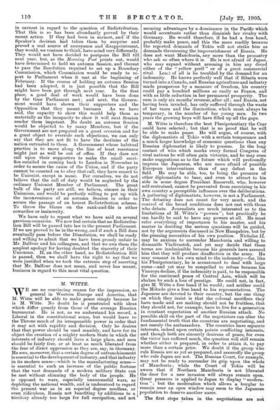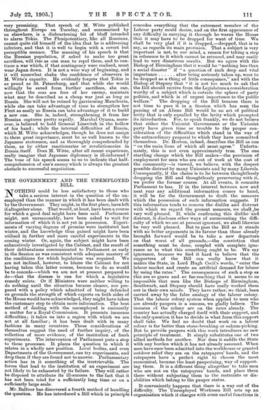M. WITTE.
WE see no convincing reason for the impression, so general in Western Europe and America, that M. Witte will be able to make peace simply because he is M. Witte. No doubt he is penetrated with ideas which differ greatly from those of the average Russian bureaucrat. He is not, as we understand his record, a Liberal in the constitutional sense, but would leave to the Throne much of its irresponsible power in order that it may act with rapidity and decision. Only he desires that that power should be used sensibly, and have for its object the creation of a mighty modern State in which the interests of industry should have a large place, and men should be fairly free, or at least as much liberated from the fear of direct oppression as they are, say, in Germany. He sees, moreover, that a certain degree of enfranchisement is essential to the development of industry, and that industry in its modern sense—which is the manufacturing sense— is essential to such an increase of the public fortune that the vast demands of a modern military State can be met without skinning the body of the people. He is opposed to wars, especially unsuccessful wars, as depleting the national wealth, and is understood to regard the present war as in an especial degree needless, or even ridiculous, Russia not benefiting by additions to a teiritory already too large for full occupation, and not securing advantages by a dominance in the Pacific which would accentuate rather than diminish her rivalry with Germany. He would therefore, if he had a free hand, probably make peace, and this the more readily because the reported demands of Tokio will not strike him as demands threatening the impoverishment of Russia. He does not want Manchuria, any more than the peasantry who ask so often where it is. He is not afraid of Japan, who may expand without arousing in him any dread either of the " yellow peril " or of a great commercial rival. Leatt of all is he troubled by the demand for an indemnity. He knows perfectly well that if Siberia were turned into a Canada, and Russian agriculture and industry made prosperous by a measure of freedom, his country could pay a hundred millions as easily as France, and with as little reduction in her permanent prosperity. The sum is only six months' revenue, after all ; and Russia, not having been invaded, has only suffered through the waste of her taxes and the diminution, which must always be temporary, in the number of her young men. In two years the growing boys will have filled up all the gaps.
M. Witte is therefore the best Plenipotentiary the Czar could have selected ; but that is no proof that he will be able to make peace. He will argue, of course, with the diplomatists of Tokio with a certain temperance and a much larger knowledge of economic questions than any Russian diplomatist is likely to possess. In the long contest of wits which marks every formal Congress of rival nations he will often gain victories, and he may even make suggestions as to the future which will profoundly impress the Japanese, who are more afraid of possible European interventions than of any defeat in the field. He may be able, too, to bring the pressure of other diplomatists to bear, and even to attract to his side in some degree President Roosevelt, who, however self-restrained, cannot be prevented from exercising in his own country a perceptible influence over the deliberations. A gathering of diplomatists, however, is not a Parliament. The debating does not count for very much, and the control of the broad conditions does not rest with those who debate. Journalists are much interested as to the limitations of M. Witte's " powers "; but practically he can hardly be said to have any powers at all. He must refer everything of importance to his master, and his master in deciding the serious questions will be guided, not by the arguments discussed in New Hampshire, but by the pressing necessities of his own position. Nicholas IL may be anxious to surrender Manchuria and willing to dismantle Vladivostok, and yet may decide that these terms are inadmissible because his generals have assured him that they will produce disaffection in the army. He may consent in his own mind to the indemnity—for, like his Plenipotentiary, he is accustomed to deal with large sums—and yet may be compelled to refuse because his Viceroys decline, if the indemnity is paid, to be responsible for the continued peace of Central Asia, which will be shaken by such a loss of prestige. He could not, in fact, give M. Witte a free hand if he would; and neither could the Mikado give a free hand to his representatives. The Japanese are devoted to their country, but the one thing on which they insist is that the colossal sacrifices they have made and are making should not be fruitless, that they should not, for example, have to live for a generation in constant expectation of another Russian attack. No possible skill on the part of the negotiators can alter the fundamental truth that the countries are negotiating, and not merely the ambassadors. The countries have separate interests, indeed upon certain points conflicting interests, and though both are sincerely desirous of peace, for even the victor has suffered much, the question will still remain whether either is prepared, in order to attain it, to pay more than a certain price. We doubt if the group who rule Russia are as yet so prepared, and assuredly the group who rule Japan are not. The Russian Court, for example, may not be ready to surrender its grip upon the whole of Manchuria ; while the Court of Tokio will be aware that if Northern Manchuria is not liberated the door for a new invasion will always remain open. Great pressure is applied to Japan to display " modera- tion " ; but the moderation which allows a burglar to remain near an open window may seem to the Japanese Ipopulation to deserve another name. The first steps taken in the negotiations are not
very promising. That speech of M. Witte published throughout Europe on Tuesday, and summarised by us elsewhere, is a disheartening bit of bluff intended to alarm Tokio. The Plenipotentiary, like all Russians, cannot quite rid himself of the idea that he is addressing inferiors, and that it is well to begin with a covert but perceptible menace. The meaning of his speech is that the Russian population, if asked. to make too great sacrifices, will rise as one man to repel them, and to con- tinue a war which, if that contingency were realised, must wear Japan down. It is not a wise way of beginning, and it will somewhat shake the confidence of observers in M. Witte's capacity. He evidently forgets that Tokio is as proud as St. Petersburg, and that while she would willingly be saved from further sacrifices, she can, now that the seas are free of her enemy, maintain what may be described as a cheap war just as long as Russia. She will not be ruined by garrisoning Manchuria, while she can take advantage of time to strengthen her Fleet as easily as Russia can take advantage of it to build a new one. She is, indeed, strengthening it from her Russian captures pretty rapidly. Marshal Oyama, more- over, is believed. to hold General Linevitch in the hollow of his hand ; while the internal difficulties of Russia, which M. Witte acknowledges, though he does not assign to them great importance, must be as well known to the Japanese statesmen, and as thoroughly comprehended by them, as by either reactionaries or revolutionaries in Russia itself. Does M. Witte, after all recent experience, really imagine that Japanese diplomacy is ill-informed. ? The tone of his speech seems to us to indicate that half- comprehension of one's enemy which is always the greatest obstacle to successful negotiation.



































 Previous page
Previous page